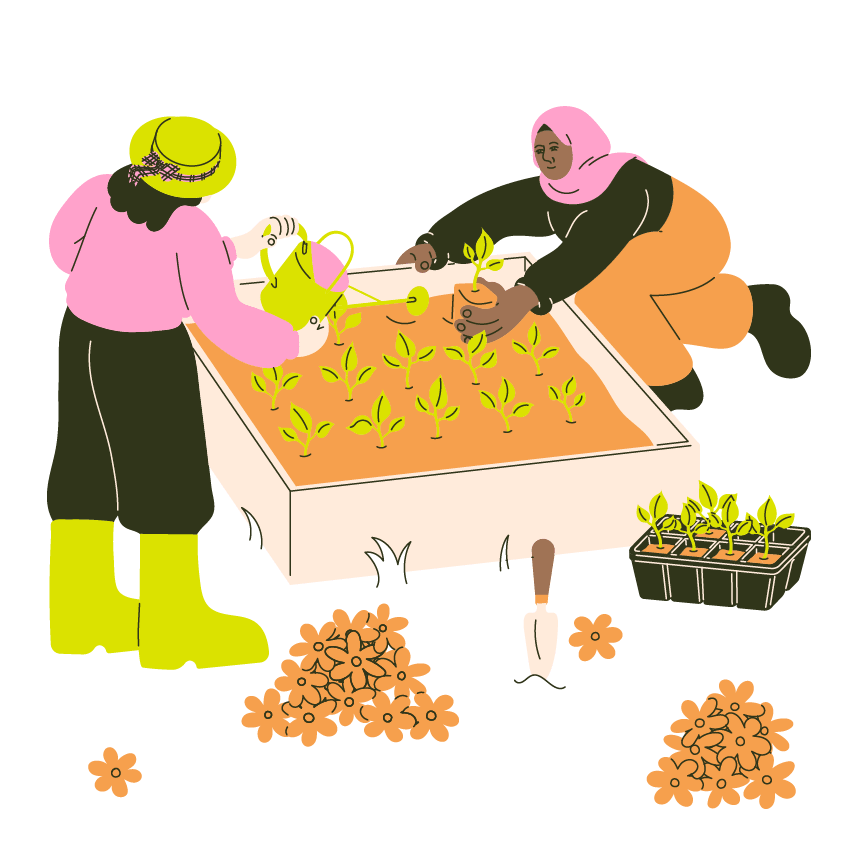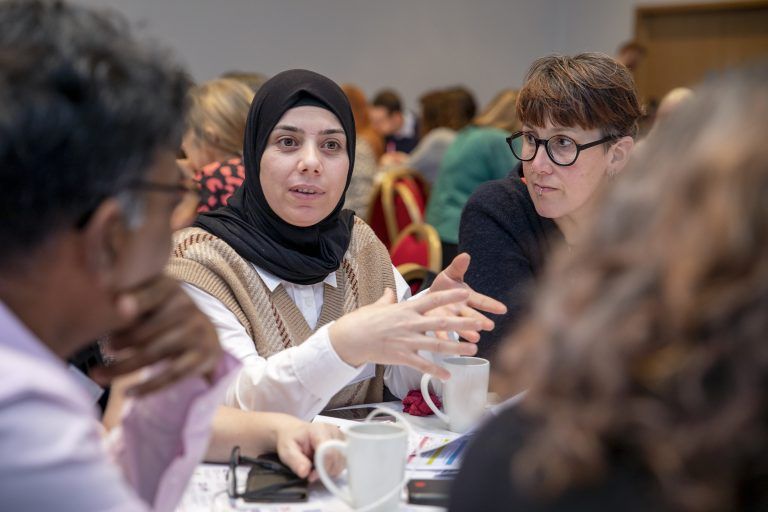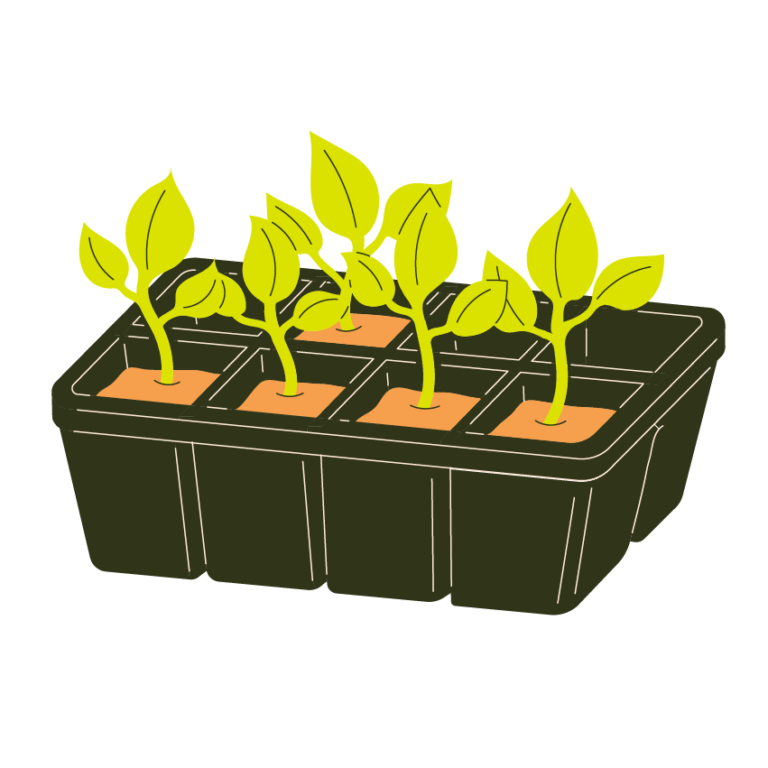Our project was set up to spread good practice by widening the impact of our successful delivery and integration of past and present projects and use this to specifically work with refugee communities and their integration into the wider society.
Refugee Community Integration Project


Our main aim of the project derived from the New Scots Refugee Integration Strategy 2018-2022, where individuals and families are entitled to basic human rights and equal opportunities to be safe, understand the entitlements, are accessing wider services and that any delivery has a longer-term impact on strategic planning and legislation going forward.
Key Information
Project Partners
Pachedu & North Lanarkshire Muslim Women and Family Alliance
Geographical reach
Glasgow, North Lanarkshire, Renfrewshire
Dates
06/09/2021 – 30/11/2022
Target Groups
Refugees, Young people
Project Type
Spreading good practice
Background
Through the Climate Challenge Fund, we have worked with diverse groups in reducing their carbon footprint, which has directly benefitted communities by increasing their skills in reducing food waste, upcycling, recycling. This, then indirectly benefits those communities who are facing food and textile poverty by providing skills which assist them on a daily basis. We have also been funded through Historic Environment Scotland for the last 9 years, which focuses on making communities a fabric part of society through increasing knowledge and awareness of local activities and initiatives that focus on heritage and the natural environment. This directly benefits the reduction of isolation and loneliness and increases mental and physical health via the introduction of active participation.
For this project, we sought to combine the above with a specific focus on refugees, who have additional barriers and challenges to community engagement and participation.
Our focus has therefore been to empower and build resilient communities through the creation of a small community exhibition and travel to local areas showcasing refugee communities’ contributions.
Involvement of New Scots in project
In order to encourage a sense of ownership for this project in the participants, we first formed a New Scots’ steering group, which met monthly to give opinions on all of our work. This group helped to inform many of the decisions made on events and workshops, as well as giving valuable insights into various aspects of other cultures. This group voted to stay together to help advise related WSREC projects.
As well as helping to plan the events, participants were encouraged to volunteer with setting up and tidying of events and workshops. All New Scots were given the chance to use the skills that they had gained through our workshops and those they already had when preparing for larger events and the exhibition. As a result of this, we have, so far had 2 participants from this project who have felt confident enough to lead a session in our ‘Chai & Chatter’ group, for our ‘Minority Ethnic Victim Support Service’.
Photography walks helped New Scots, some of whom had very little idea about parks and greenspace in Glasgow, to navigate the city more successfully by foot and increased their knowledge of public transport routes.
Impact
We made successful connections with refugees/asylum seekers and groups and made meaningful changes in the lives of certain individuals, who have grown to trust us for help and advice.
Our ongoing relationships with some service users and partners will last into our next project and beyond.
Participant numbers were lower than expected but were beginning to grow by the end of the project. This is probably due to the end of Covid 19, and our moving into new premises in October 22.
We have further familiarised people in the Ruchill area, which is traditionally very White Scottish, with Refugee communities. The AutumnFest was a great example of this, as we had lots of curious local guests that day, asking the service users about their experiences with us, and chatting about their lives in general. One local man invited us to bring a group of refugees to his recording studio to make music.

Challenges encountered
Our office situation has been confusing for some potential participants, as they may not be familiar with the area, and we only moved into our new premises last month. Before that, workshops were in assorted locations, and although we tried to keep things as simple as possible, we occasionally found that we had to change venue.
Having to readvertise for new participants for each activity to avoid double counting was a particular challenge, especially when some past participants were keen to repeat a course.
Solutions
Now that we are settled in Shuna Street, we hope that engagement will grow. We have recently started to print more paper leaflets rather than relying mainly on email and social media, and are ensuring that they are on notice boards in doctor’s surgeries, places of worship, community centres etc.
How the project has expanded on existing examples of good practice
This was our first project focussing solely on New Scots. We were able to learn much about the unique problems that they face, and this knowledge can be passed on and used in future WSREC projects. The RCIP has helped to benefit the environment by teaching waste reduction and nature appreciation, while also helping New Scots to make friends and become better integrated into their new society.
The difficulties of taking on a new approach
Working solely with New Scots presented a few extra difficulties, such as additional language barriers; participants lacking confidence in finding their way around Glasgow; making contact and establishing trust in us. There is no doubt though, that we are glad to have persevered with these challenges and to have helped people in the process.
Reflections
We learnt to approach groups rather than individuals when looking for participants because people don’t want to come to activities alone.
We learnt to take our activities to group’s location if getting to us is difficult for them.
Further information
The project resources have been developed in the beginning of the project delivery such as: project marketing leaflets, generating newsletters, developing partnership working with faith groups, United Yemeni community and job centres, taking referrals from WSREC’s internal projects and working with climate action programme for successful delivery of the project services. WSRECs services have expanded in recent years due to the ongoing commitment for fairness and equality for our target communities. WSREC has Data protection policy, Equal opportunity policy, Privacy policy, Protection of vulnerable group policy and safeguarding policy in place to practice within Minority ethnic communities. Our need is identified through our regular activities, feedback from our beneficiaries, our Board and local communities who access our services. We regularly obtain feedback on how to manage our delivery, ensure it is community led and driven.


